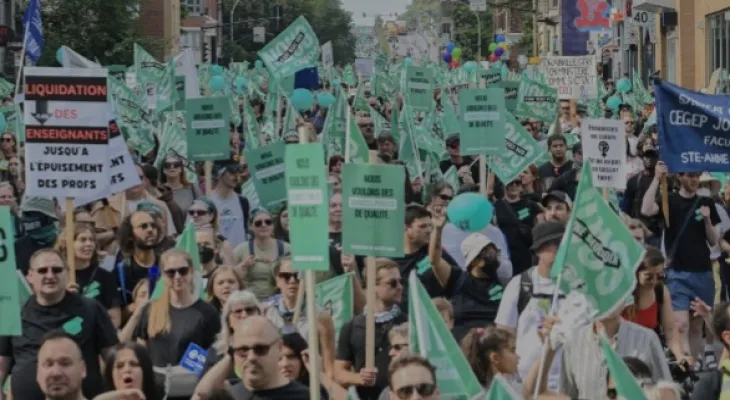Search here
Newspaper
Search here

Arab Canada News
News

Published: November 6, 2023
Hundreds of thousands of public sector workers in Quebec stopped working today, Monday, in the first series of one-day strikes.
Schools, healthcare facilities, and social services will be disrupted as four unions representing a joint front of about 420,000 workers strike in protest against the latest contract offer in the province.
The unions promise to fight a historic battle to maintain their purchasing power during a period of high inflation.
The latest offer presented by the government includes a 10.3 percent salary increase over five years and a one-time payment of $1,000 to each worker – a proposal the unions described as "trivial."
The strike will continue from midnight to 10:30 a.m. in primary and secondary schools and until noon in preparatory colleges.
Some health and social services, including mental health, youth protection, and medical imaging, will also operate at rates ranging between 70 and 85 percent, depending on the department.
Emergency and intensive care services will be maintained at 100 percent.
Other unions are also expected to organize strikes in the coming days, including a two-day strike on Wednesday and Thursday by the union representing 80,000 nurses, nursing assistants, respiratory therapists, and other health professionals.
Meanwhile, a union representing about 65,000 teachers in Quebec also said it will start an unlimited general strike on November 23 if no agreement is reached.
Negotiations have been ongoing since the beginning of the year, after the government presented its offer in December 2022.
Both sides were still at the table until Friday, according to Robert Cuomo, head of the Alliance of Professional and Technical Employees of Health and Social Services (APTS).
In this regard, the government said that in addition to salary increases, its offer includes more money for workers and shifts it considers priorities, such as nurses working at night and on weekends and teacher assistants in primary schools. Workers earning less than $52,000 annually will receive an additional 1% increase.
On the other hand, the unions say the government's proposal does not cover inflation.
They responded by demanding a three-year contract with annual increases linked to the inflation rate: two percentage points above inflation in the first year or $100 per week, whichever is more beneficial, followed by three points higher in the second year and four points higher in the third year.
Comments